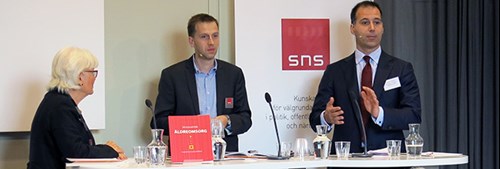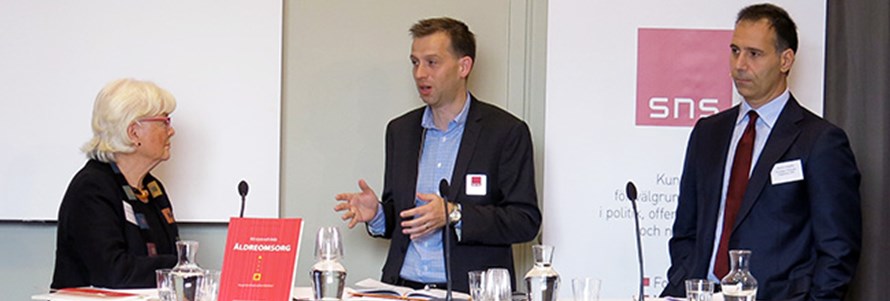In the picture from left: Gun-Britt Trydegård, Henrik Jordahl and Jannis Angelis.
“In comparison to most countries Swedish homes for the elderly can exhibit a high-quality of leadership and management”, said Henrik Jordahl at the seminar.
He explained that 89,000 elderly live at Swedish nursing homes and 220,000 are being assisted in their homes through home care services. The cost of care for the elderly is SEK 90 billion a year, equivalent to 2.7 percent of GDP. One-fifth of homes for elderly are provided by private companies.
“An average accommodation for the elderly has room for 40 people”, explained Jannis Angelis.
“Overall the management quality is fine”, said Henrik Jordahl.
 In the picture from left: Gun-Britt Trydegård, Henrik Jordahl and Jannis Angelis.
In the picture from left: Gun-Britt Trydegård, Henrik Jordahl and Jannis Angelis.
To execute the survey, operations managers at about 500 of the country's 2,300 nursing homes were interviewed. The researchers found no significant difference in regards to management quality between private and public providers. The difference is larger within each of these groups than between them, though large private companiesstand out to some extent. Homes run by these corporations are the most adeptly governed and managed. The researchers found the greatest variation in quality when it came to management by objectives. “This is unexpected as the costs are low”, said Henrik Jordahl.
Researchers have observed that many managers in homes for the elderly do not take advantage of the expertise and possibilities that the employees bring to the workplace. This is, argues the researchers, where you can find significant development potential.
Gun-Britt Trydegård, PhD in Social Work and a researcher at the Department of Social Work, Stockholm University, said that the report was very educational. Still, she was hesitant that the study has provided more knowledge about the quality of elderly care. “The response rate was 21 percent, so you should be careful in drawing general conclusions”, said Trydegård.
The researchers did not agree that the research method used is not suitable for measuring the quality of management in nursing homes for the elderly. “We should not measure less but more. It is possible to measure quality”, said Jannis Angelis.

